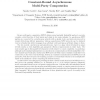Free Online Productivity Tools
i2Speak
i2Symbol
i2OCR
iTex2Img
iWeb2Print
iWeb2Shot
i2Type
iPdf2Split
iPdf2Merge
i2Bopomofo
i2Arabic
i2Style
i2Image
i2PDF
iLatex2Rtf
Sci2ools
IACR
2016
2016
Constant-Round Asynchronous Multi-Party Computation
Secure multi-party computation (MPC) allows several mutually distrustful parties to securely compute a joint function of their inputs and exists in two main variants: In synchronous MPC parties are connected by a synchronous network with a global clock, and protocols proceed in rounds with strong delivery guarantees, whereas asynchronous MPC protocols can be deployed even in networks that deliver messages in an arbitrary order and impose arbitrary delays on them. The two models—synchronous and asynchronous—have to a large extent developed in parallel with results on both feasibility and asymptotic efficiency improvements in either track. The most notable gap in this parallel development is with respect to round complexity. In particular, although under standard assumptions on a synchronous communication network (availability of secure channels and broadcast), synchronous MPC protocols with (exact) constant rounds have been constructed, to the best of our knowledge, thus far no con...
Biometrics | IACR 2016 |
| Added | 03 Apr 2016 |
| Updated | 03 Apr 2016 |
| Type | Journal |
| Year | 2016 |
| Where | IACR |
| Authors | Sandro Coretti, Juan A. Garay, Martin Hirt, Vassilis Zikas |
Comments (0)

